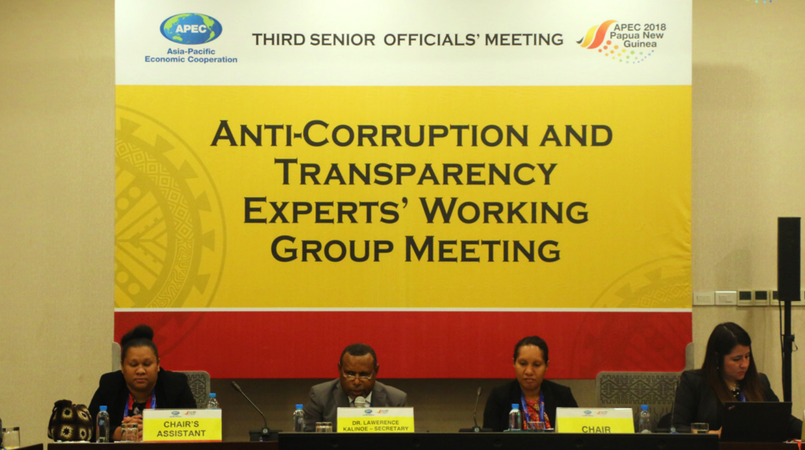
The progress on the implementation of anti-corruption preventative measures under the United Nations Convention Against Corruption (UNCAC) showcased some encouraging progressive economy reports.
Of the 21 APEC member economies, New Zealand is second to Singapore as being the least corrupt country in the world.
Anti-Corruption and Transparency Working Group (ACT) chair, Roselyn Gwaibo, on behalf of New Zealand, presented their economy’s report on anti-corruption progress and development of the UNCAC during the ACT Experts Working Group meeting yesterday at the International Conference Centre in Port Moresby.
The meeting is part of a cluster of meetings at the APEC Third Senior Officials’ Meeting (SOM3) that commenced on Saturday, August 4.
Gwaibo in her presentation explained how New Zealand implements its anti-corruption work.
“There is a recommendation to implement an anti-corruption work program to be led by the Serious Fraud Office and Ministry of Justice (NZ) with support from relevant agencies.
“This program aims to enhance New Zealand’s compliance with its international obligations under the OECD Convention of Combating Bribery of Foreign Public officials in international business transactions and the UN Convention Against Corruption.
“New Zealand will be reviewed for its compliance with both conventions in 2020,” she said.
The Anti-Corruption work program was designed following a cross agency consultation project aimed at better understanding New Zealand’s corruption landscape and risks.
“It is a further commitment by New Zealand to continue to combat corruption and maintain New Zealand’s reputation as one of the least corrupt economies in the world.”
A multilateral treaty to address anti-corruption, UNCAC covers 5 main areas:
- Preventative measures
- Criminalization and law enforcement
- International cooperation
- Asset recovery
- Technical assistance and,
- Information exchange
“We all have our challenges but all we recognise that corruption is cross cutting and it doesn’t mean that we’re a developing nation and we’re much different from a developed nation, we are all working together to address anything that is affecting our economic growth,” stated Gwaibo.
“From all the UNCAC economy presentations, I believe PNG can learn from all of them particularly on innovative ways on how to prevent corruption.
“We did reach out to economies like Hong Kong, China and Malaysia, but as I said we all have our challenges, we have our own domestic rules in place.
“It’s always good to learn from others on what they’re sharing today to make sure that we work together to address this issue.”
In terms of PNG’s progress under UNCAC, it has implemented a number of preventative measures which include:
- The establishment of the branch of a special prosecutor on corruption- the Office of the Public Prosecutor established a dishonesty unit which specialises in prosecuting corruption related offences and continues to train and build experience which in turn significantly encourages informed litigation.
- The Chief Justice launched a new specialised track for fraud and corruption which is established under the Criminal Fraud Practise and Corruption related Offences Rules (2003) and applies to offences involving theft, fraud, dishonesty and misappropriation of property and official corruption. The intent is to have speedy hearings to all corruption related offences.
- The increased use of specialised, special taskforces- the PNG government has over the years has used short term special investigation taskforces to probe areas wanting immediate action in government departments and agencies.
